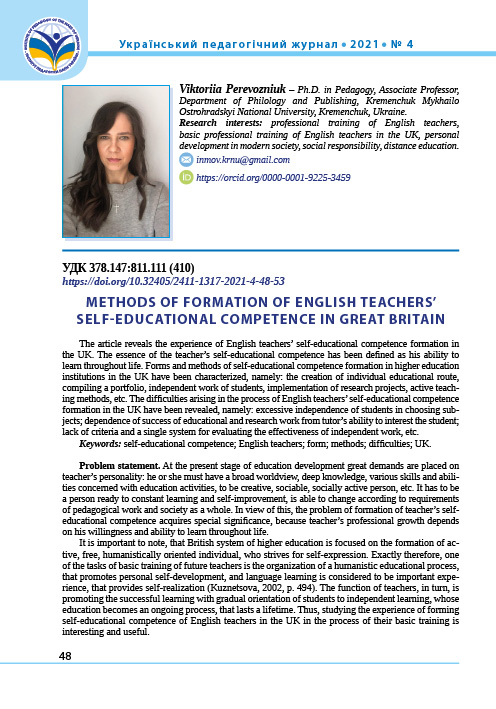Abstract
The article reveals the experience of English teachers’ self-educational competence formation in the UK. The essence of the teacher’s self-educational competence has been defined as his ability to learn throughout life. Forms and methods of self-educational competence formation in higher education institutions in the UK have been characterized, namely: the creation of individual educational route, compiling a portfolio, independent work of students, implementation of research projects, active teaching methods, etc. The difficulties arising in the process of English teachers’ self-educational competence formation in the UK have been revealed, namely: excessive independence of students in choosing subjects; dependence of success of educational and research work from tutor’s ability to interest the student; lack of criteria and a single system for evaluating the effectiveness of independent work, etc.
References
Bazurina, V. М. (2006). Profesiyna pidhotovka maibutnih vchyteliv inozemnyh mov u Velykiy Brytanii. PhD thesis: 13.00.01, Zhytomyr Ivan Franko State University, 235. [in Ukrainian].
Zadorozhna, І. P. (2002). Osoblyvosti metodychnoi pidhotovky vchyteliv angliyskoi movy u Velykiy Btytanii. Extended abstract of PhD thesis: 13.00.04, 20. [in Ukrainian].
Kozachenko, I. V. (2015). Innovatsiyni tehnolohii v systemi pidhotovky maibutnih uchyteliv inozemnyh mov u Velykiy Brytanii ta Ukraini (porivnialnyi analiz). PhD thesis: 13.00.04, State Higher Educational Institution «Pereyaslav-Khmelnitsky State Pedagogical University named after Hryhoriy Skovoroda», 219. [in Ukrainian].
Kozubovska, І., Popovych, І., & Rokosovyk, N. (2019). Zmist, formy i metody pidhotovky pedahohichnyh kadriv do naukovodoslidnytskoi diyalnosti u Velykiy Brytanii. Methodical recommendations, Uzhhorod National University, 32. [in Ukrainian].
Kudina, V. V. (2011). Modeli profesiynoi pidhotovky vchyteliv u riznyh krainah: zistavnyi analiz. Theoretical Questions of Culture, Education and Upbringing, Kyiv National Linguistic University, 44, 19–23. [in Ukrainian].
Kuznetsova, O. Yu. (2002). Rozvytok movnoi osvity u serednih i vyshchyh navchalnyh zakladah Velykoi Brytanii dryhoi polovyny XX st. Doctor’s Thesis: 13.00.01, Kharkiv State Pedagogical University named after H. S. Skovoroda, 494. [in Ukrainian].
Novikova, Yu. B. (2014). Praktiko-orientirovannyi podhod k professionalnoi podgotovke britanskogo uchitelia (konets XX – nachalo XXI v. v.). PhD thesis: 13.00.01, Institution of Higher Professional Education «Moscow State Regional Social and Humanitarian Institute», 208. [in Russian].
Samoylyukevych, I. V. (2007). Profesiynyi portret suchasnoho vchytelia inozemnoi movy u Velykiy Brytanii. Bulletin of Zhytomyr Ivan Franko State University, Zhytomyr Ivan Franko State University, Issue 33, 40–44. [in Ukrainian].
Sokolova, А. V. (2009). Profesiyna pidhotovka vchytelia u systemi pedahohichnoi osvity Anglii i Shotlandii. Extended abstract of PhD thesis: 13.00.01, 20. [in Ukrainian].
Chimiris, Yu. V., Tanko, Ye. V., & Chubukina, O. V. (2017). Tendentsii rozvytku organizatsii samostiynoi roboty studentiv v universytetah Velykoi Brytanii. Humanitarian Bulletin of State Higher Educational Institution «Pereyaslav-Khmelnitsky State Pedagogical University named after Hryhoriy Skovoroda». Gnosis, 37(3),
Т. I(21): Thematic Issue «International Chelpanivski psychological-pedagogical reading», 314–326. [in Ukrainian]
Coleman, J. A. (Ed. by E. Hawkins). (1997). University Courses for Non-specialists. London: CILT, 71–78.
Darabi, R. (2006). Basic Writing and Learning Communities. Journal of Basic Writing, 25 (1), 53–72.
Day, Ch. (1994). Personal Development Planning: a Different Kind of Competency. British Journal of In-Service Education, Vol. 20. № 3, 287–302.
Ghaye, T., & Ghaye, K. (1998). Teaching and Learning through Reflective Practice. London: Routledge, 148.
Hunter, M. (2001). Raising Learner’s Motivation. Effective Teaching at High School and University. Boston: Alyn and Bacon. 231.
Moeller, A. K., & McNutty, A. (Eds. D. McAlpine and S. Dhonau. Eau Claire, WI: Crown Prints). (2006). WebQuests, Teacher Preparation and Language Learning: Theory into Practice. Responding to a New Vision for Teacher Development: 2006 Report of the Central States Conference on the Teaching of Foreign Languages, 63–75.
Professional Standards for Teachers. (2020). Qualified Teacher Status. London: TTA, p. 14.
European Comission. Education and training. (2013). Supporting Teacher Competence Development for Better Learning Outcomes. р. 59 URL: https://ec.europa.eu/assets/eac/education/experts-groups/2011–2013/teacher/teachercomp_en.pdf (date of application: 03.12.2019).
Teachers’ Standards: Guidance for School Leaders, School Staff and Governing Bodies. (2011). London: Department for Education, p. 15.
University of York. Department of Education. (2013). URL: http://www.york.ac.uk/education/ (date of application: 03.04.2020).
Zeichner, K. (2007). Accumulating Knowledge Across Self-Studies in Teacher Education. Journal of Teacher Education, Vol. 58. Issue 1, 36–46.

This work is licensed under a Creative Commons Attribution-NonCommercial-ShareAlike 4.0 International License.
Copyright (c) 2021 Вікторія Перевознюк

